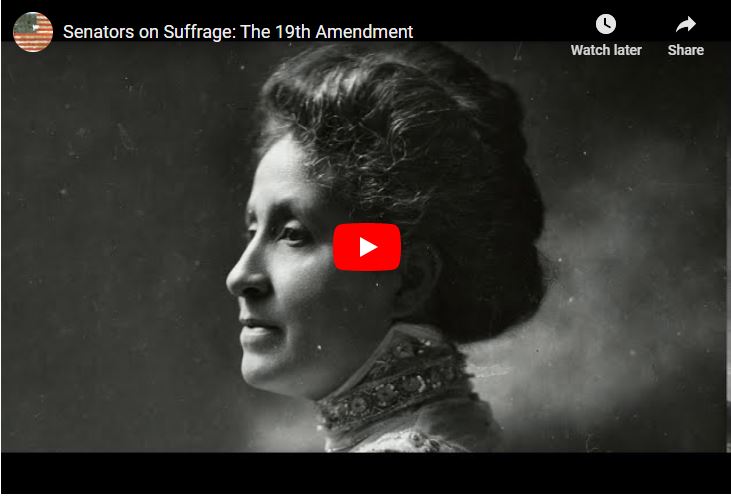Smithsonian Magazine
Women Senators Reflect on the 100th Anniversary of Suffrage
Twenty-four lawmakers shared testimonials with the Smithsonian’s National Museum of American History
By Meilan Solly, SMITHSONIANMAG.COM
When suffragist Jeannette Rankin was elected to the United States House of Representatives in 1916, she made a prescient prediction: “I may be the first woman member of Congress. But I won’t be the last.”
One hundred and four years later, a record-breaking number of women sit in both congressional chambers, with 26 serving in the Senate and 105 in the House. Now, on the 100th anniversary of the ratification of the 19th Amendment, which extended the franchise to (mostly white) women on a federal level, the Smithsonian’s National Museum of American History has partnered with Senators Dianne Feinstein of California and Marsha Blackburn of Tennessee to present a collection of women senators’ reflections on suffrage.
The testimonials—available via the online version of the museum’s “Creating Icons: How We Remember Woman Suffrage” exhibition—run the gamut from personal anecdotes to visions of the future and celebrations of trailblazing women activists, including Anne Henrietta Martin, Marilla Ricker, Sojourner Truth and Carrie Chapman Catt.
Several recurring themes persist: namely, the experience of being “the first” woman to hold a certain position and the importance of encouraging future generations to continue upending politics’ male-dominated status quo.
As Senator Cindy Hyde-Smith, who became Mississippi’s first woman congressional representative in 2018, reflects, “Society should encourage young women to pursue elected office. In fact, society needs them. I feel a level of gratification when younger women and girls look at me and see that they can also do these things.”
Senator Kamala Harris, who served as California’s first woman attorney general and is now the first woman of color nominated for national office by a major political party, says she draws inspiration from her predecessors, crediting women like Harriet Tubman, Ida B. Wells and her own mother with guiding her career in public service.
Adds Harris, “My mother used to say, ‘Don’t sit around and complain about things, do something.’”
Echoing her colleagues’ sentiments, Senator Debbie Stabenow of Michigan emphasizes the power of representation, explaining, “If there is only one, that’s a token. If we have many women’s voices, we have a democracy.”
In addition to spotlighting senators’ stories, “Creating Icons” explores the aftermath of the 19th Amendment’s ratification, from suffrage leaders’ deliberate omission of certain narratives—particularly those of women of color—to the movement’s modern successors, including the 1977 National Women’s Conference and the 2017 Women’s March.
“The 19th Amendment gave women the ability to vote for themselves. Because of the 19th Amendment, the women of Congress have the ability to vote on behalf of all of us. They can create new amendments,” says the show’s curator, Lisa Kathleen Graddy. “It wasn’t without setbacks and it wasn’t without struggle. A 100th anniversary, especially in an election year, is the perfect time for them to reflect on how the 19th Amendment and the opportunities and challenges it created inspired them to public service and to share their advice for the next generation of women who will serve and lead.”
Read excerpts from 24 senators’ statements below, and click the link at the bottom of each profile to navigate to the full testimonial. Entries are organized alphabetically by state and last name.
Cindy Hyde-Smith | Mississippi
Year Mississippi Women Gained Suffrage: 1920
First Female Mississippi Senator Elected: 2018 (Hyde-Smith)
First Woman in Congress Representing Mississippi: 2018 (Hyde-Smith)
As I proudly cast my first votes in 1980, little did I know that decades later I’d follow those suffragists’ tenacity, will, and fight to jump into the political realm—becoming the first woman to serve from my state senate district, the first woman to chair an agriculture committee, and the first woman to be elected the Mississippi Commissioner of Agriculture and Commerce. Today, I have the privilege to represent my home state as the first woman elected from Mississippi to the serve in the United States Congress.
It is also important for us to reflect on what we can do to further equality and representation for women. We must continue to ensure women are represented in the highest levels of government. Society should encourage young women to pursue elected office. In fact, society needs them.
Read the full statement here.

